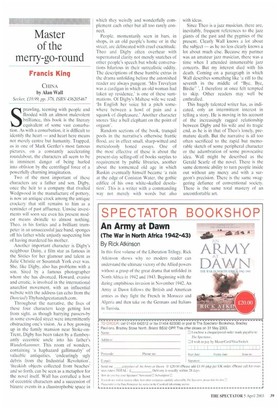Master of the merry-go-round
Francis King
CHINA by Alan Wall Seeker, £10.99, pp. 378, ISBN 436205467
Sprawling, teeming with people and flooded with an almost malevolent brilliance, this book is the literary equivalent of some vast conurbation. As with a conurbation, it is difficult to identify the heart — and heart here means not merely centre but humanity. Trapped, as in one of Mark Gertler's most famous pictures. on a constantly accelerating roundabout, the characters all seem to be in imminent danger of being hurled into oblivion by the centrifugal force of a powerfully churning imagination.
Two of the most important of these characters are a father and son. Digby, once the heir to a company that rivalled Wedgwood in the manufacture of pottery, is now an antique crock among the antique crockery that still remains to him as a reminder of past affluence. Unwise investments will soon see even his present modest means dwindle to almost nothing. Theo, in his forties and a brilliant trumpeter in an unsuccessful jazz band, sponges off his father while unjustly suspecting him of having murdered his mother.
Another important character is Digby's neighbour Daisy, a film star as famous in the Sixties for her glamour and talent as Julie Christie or Susannah York ever was. She, like Digby, also has problems with a son. Sired by a famous photographer whom she has divorced, Howard, evasive and erratic, is involved in the international anarchist movement, with an influential website with the address (an echo from the Dunciad) Thyhandgreatanarch.com.
Throughout the narrative, the lives of these four characters keep getting lost from sight, as though hurrying passers-by in some crowded street were intermittently obstructing one's vision. As a boy growing up in the family mansion near Stoke-onTrent. Digby has been taken by a flamboyantly eccentric uncle into his father's Wunderkammer. This room of wonders, containing 'a haphazard gallimaufry' of valuable antiquities, 'endearingly ugly debris from the Industrial Revolution', 'freakish objects collected from beaches' and so forth, can be seen as a metaphor for the novel itself. Wall has corralled a host of eccentric characters and a succession of bizarre events in a claustrophobic space in which they weirdly and wonderfully complement each other but all too rarely connect.
People, momentarily seen in bars, in shops, in an old people's home or in the street, are delineated with cruel exactitude. Theo and Digby often overbear with supernatural clarity not merely snatches of other people's speech but whole conversations hilarious in their surrealistic oddity. The descriptions of these humble extras in the drama unfolding before the astonished reader are always pungent. 'Mrs Trevelyan was a cardigan in which an old woman had taken up residence,' is one of these summations. Of Digby's Maltese wife we read: 'In English her voice hit a pitch somewhere between a howl of pain and a squawk of displeasure.' Another character snores 'like a bull elephant on the point of Orgasm'.
Random sections of the book, tranquil pools in the narrative's otherwise frantic flood, are in effect small, sharp-witted and meticulously honed essays. One of the most effective of these is about the present-day selling-off of books surplus to requirement by public libraries, another about the tormented old age in which Ruskin eventually himself became 'a ruin at the edge of Coniston Water, the gothic edifice of his own white-skulled desolation'. This is a writer with a commanding way not merely with words but also with ideas.
Since Theo is a jazz musician, there are, inevitably, frequent references to the jazz giants of the past and the pygmies of the present. Clearly Wall knows a lot about the subject — as he no less clearly knows a lot about much else. Because my partner was an amateur jazz musician, there was a time when I attended innumerable jazz concerts. But my interest died with his death. Coming on a paragraph in which Wall describes something like 'a riff to the seventh in the middle of "Bye, Bye, Birdie" I therefore at once felt tempted to skip. Other readers may well be enthralled.
This hugely talented writer has, as indicated, only an intermittent interest in telling a story. He is moving in his account of the increasingly ragged relationship between Digby and his wife and its tragic end, as he is in that of Theo's lonely, premature death. But the narrative is all too often sacrificed to the rapid but memorable sketch of some peripheral character or the adumbration of some provocative idea. Wall might be described as the Gerald Scarfe of the novel, There is the same demonic ability to turn people inside out without any mercy and with a surgeon's precision. There is the same swaggering defiance of conventional society. There is the same total mastery of an uncomfortable art.


































































 Previous page
Previous page